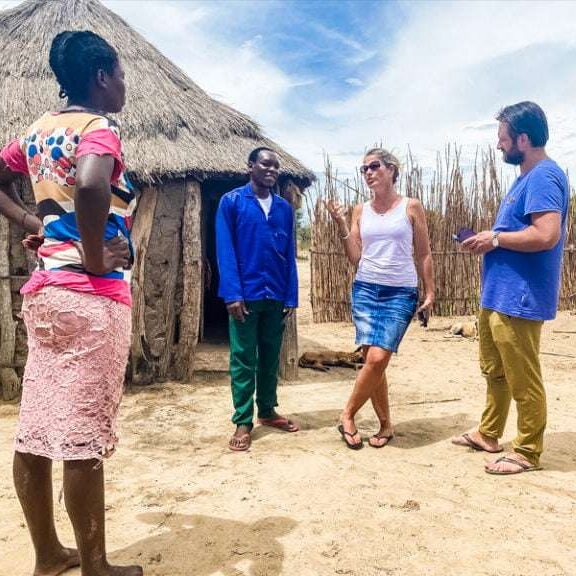A psychiatrist in Namibia
In November 2020 I was on my 2nd assignment for MUDIRO in northern Namibia and was able to gain many impressions and experiences.
During the 3 weeks I was in two hospitals in Andara and Nyangana to treat patients there and to give training for nurses and doctors. I used the outreach vehicle and my own vehicle to visit and treat patients at their homes because they could not come to the Andara Hospital themselves. Seeing the local people in their homes gave me an even deeper insight into everyday life than would have been possible through working in the hospital alone. Understanding what is missing and what exactly the everyday difficulties are, went far beyond purely psychiatric treatment. It was not always possible to find a helpful way, because of things that are small things for us in the western world, such as the availability of suitable medication or the possibility of the patients being able to come to the hospital because they do not have a car, nor the money to be able to afford the transport.
In addition to working in the hospitals, I was invited to a meet the director of the Max Makushe school as part of the project to train life skills teachers on sex education to reduce sexually transmitted diseases and prevent teenage pregnancies. Here it was once again shown how incredibly motivated and committed many of the people here are and what bureaucratic hurdles they often face or what things slow them down. We were able to win the Max Makushe school as a project school and we will start training the life skills teachers next year. Not only the director, but also Pius, a teacher at this school, gave me a deep insight into the various problems that young people face, especially when it comes to dealing with their sexuality and the subject of contraception. You could tell they were sad that every year many of the students stopped coming to class because they became pregnant. I was impressed by the efforts and tirelessness of these teachers and at the same time I became more aware of the importance of giving support here. I was able to discuss with the director of the school that not only professional information is urgently needed, but also ways of conveying this still highly sensitive topic of sexuality, which is fraught with many prejudices and cultural ideas.
From the beginning it was planned that I would use my experience in sex education and my knowledge of conveying complex content as a psychotherapist and psychiatrist for this project. The idea was that I would come to Namibia twice a year for a few weeks each time. Unfortunately, due to the corona pandemic, this was not yet possible in this frequency in 2020 and unfortunately this one operation had to remain.
In addition, the most important problems and possible solutions were discussed in a very interesting meeting with the social workers in the region. The social workers are often the first and not infrequently the only ones to deal intensively with people who have suffered trauma. In the north of Namibia there are neither psychiatrists nor psychotherapists, not to mention trauma therapy. The honesty and clarity in naming the problems, but also in the elaboration of possible solutions, including the clear formulation in which areas they would like support and training, was impressive here too. Despite an incredibly high workload and an almost unmanageable field of tasks, a huge commitment was noticeable from all those involved and I am looking forward to putting the projects prepared in this meeting into practice, in particular training the social workers on how to deal with traumatized people, Especially women and young people after experiencing (sexual) violence.
In each of the two hospitals, I was able to give a lecture on the preparation of a suitable anamnesis discussion for psychiatric patients and another lecture on psychotic diseases, e.g. schizophrenia.



It is thanks to the commitment of the nursing staff and medical colleagues that it did not stop at a theoretical lecture, but immediately began to put what had been heard into practice. Dealing with patients changed and there was a growing interest in looking behind the obviousness of some psychiatric symptoms.
The drug options, especially for psychiatric patients in particular, due to the very few drugs available, are and will remain very limited, optimizing the dosage, the duration of use and the recurring questioning of the correctness of the Diagnosis can be effected a lot. I am grateful that the nurses and doctors in both hospitals, in which I was allowed to be, were not only attentive listeners, but mostly changed things with great enthusiasm. I keep thinking of a young colleague in Andara, how proud he was when he was able to make it clear in the morning meeting that he had learned what he had learned, be it in the lectures and bed-side teaching of the internist who was present at the same time Dr. med. Nadja Urbanek, or mine, has already used it in a targeted manner. His unbelievable thirst for knowledge and joy in the new experience inspired me anew every day and showed me that change is possible despite all difficulties and adversities.
An important experience for me was to find out that in Andara not a single antipsychotic drug in tablet form was available in the hospital. This meant that the medical equipment was no longer just unsatisfactory, but simply nothing left that could be given to the patient, apart from the intravenous administration, which had significantly more dangerous side effects. Together with the responsible chief physician Dr. Mariwa to organize at least haloperidol (a highly potent antipsychotic) in tablet form within just one day.
The warm, open and honestly appreciative reception at all levels, be it in the hospital, be it in school, or in the community, impressed me again. During my assignment in 2020 I got the feeling that important courses and important steps could be set. One must always be aware that these can only be small steps and that the possibilities are limited, but small steps also make a movement in the right direction. Coming back and assuring people that I will not only be back next year, but also to implement the projects, ideas and training courses they have planned together with them, makes me impatient to come back to Namibia.
I look forward to the challenges of the next few years, especially to be able to build a new project with regard to sex education and to deepen the work with the social workers. With all this, the work in the hospitals will always be necessary and will constitute an important part of my work here.
The north of Namibia, the people with their openness, their approach and their warmth, for me again and again outshine the sometimes merciless and cruel hardship that life here offers for many and that can sometimes leave you sad and stunned. And every time you think you are powerless and powerless, you take a small step further with the local people, further into a better future. I don’t come here because I know how things work, but because I am firmly convinced that the people here with their incredible commitment and strength deserve to be supported in their struggle.
A part of me always stays there – in the north of Namibia, which has become a bit like a second home for me.
Dr. med. univ. Matthias Rohwer
-Specialist in psychiatry and psychotherapy-

Read more about our news and projects here:

